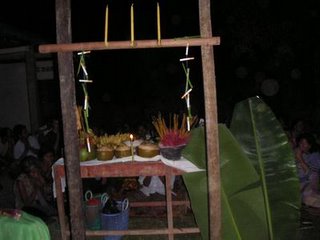
This past week was the Water Festival in Phnom Penh, a three-day event which usually draws almost two million people from the countryside to come to the capital, which normally has a population between one and two million, depending on how the city limits are defined. I only spent a little time in Phnom Penh during the festival, as it is quite a chaotic and crowded event. At night, particularly, the streets near the water front and major parks are packed with people, and it is difficult to move. But for many Cambodians, especially those who come from the countryside, it is a wonderful event and a celebration of national pride. The boat races are the highlight of the event, with long boats (see photo above) competing head-to-head in the Tonle Sap river.
However, the countryside has its own version of the Water Festival that is equally special. Most provinces have their own boat races, but to me the most interesting part comes during the evening. The ambok (raw, unhusked rice that is crushed flat and roasted) ritual usually takes place well after the sun has set, during the night of the full moon which occurs during the three days of the water festival. The ceremony is nearly identical to that which takes place concurrently in the royal palace. The royal ceremony, ostenstibly Brahmanstic (Hindu), has mnay animistic elements as the essential purpose is predicting and petitioning for good rainfall in the coming year. However, the full moon night is also significant in Buddhism, as it is the time when monks and laypeople renew their vows to lead upright and virtuous lives.

Above is the table where food offerings are made, including bananas, coconuts, sugar cane, and ambok. The food will later be mixed together and eaten--it's quite delicious!
 Because of the full moon night, Buddhist Pali chants are recited along with the animistic petitions for rain.
Because of the full moon night, Buddhist Pali chants are recited along with the animistic petitions for rain.
The three candles on the top of the wood frame represent three districts in Kompong Speu province. They were later allowed to drip thier melting wax onto the large banana leaves as a way of predicting the amount of rainfall in each district. I was very glad that I was able to witness and participate in this event and see the whole village come together, revealing many more aspects of Khmer culture than I ever would have been able to see in Phnom Penh or read in a book.
No comments:
Post a Comment